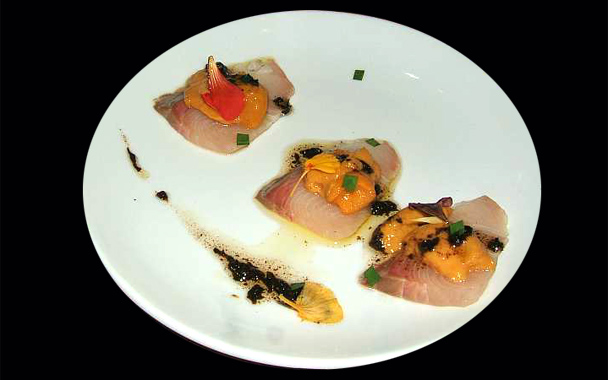When it comes to sea urchin roe, there are two kinds of people: Those like my old boss, who says it tastes like “something scraped off the bottom of an oil tanker;” and those who prize its creaminess and marine flavor. My allegiance lies with the latter camp. Uni (the Japanese name for the roe) is a regular fixture on high-end sushi menus, and until recently the best I’d had was at Bar Masa. The Californian uni had such a mellow flavor that after eating one piece, I immediately ordered an oversized martini glass of it mixed with ama ebi, or sweet shrimp.
But Bar Masa’s ethereal urchin has since been topped by the smoked uni from Grindstone Neck of Maine.
It all started this winter when I visited my dear friend Jonathan Forester, who had moved from Westchester to Maine last year. He introduced me to Carl Johnson, a CIA grad and owner of the family-run Grindstone Neck in Winter Harbor. We tasted some wonderful cold-smoked Alaskan sockeye salmon as well as unbelievable crab claws that had been smoked in Grindstone’s room-sized Enviro-Pak smoker. The unit can handle up to 700 pounds of salmon at a time and has all sorts of gauges, although Johnson is quick to point out that everything he smokes is still evaluated the old-fashioned way, rather than by computer like at some smokehouses. When the conversation turned to uni, my jaw dropped. Johnson told us he had successfully smoked sea urchin before, but not commercially.
I forgot all about smoked sea urchin until Jonathan called me a few months later and told me he’d be in New York for a Head to Tail Dinner at the Astor Center in March and would be toting a few batches of smoked uni. I was giddy with excitement. I love smoked fish—and by virtue of several summers spent on the competition barbecue circuit with Robbie Richter, I’m no stranger to the smoky arts—but I could hardly imagine what smoked uni would taste like.
We were hanging out in the Astor Center’s kitchen as Chris Cosentino of San Francisco’s Incanto prepared various nasty bits for the upcoming offal-fest, so we turned him and his crew on to the uni. The box was divided into the lighter orange-colored female roe and its darker, firmer male counterpart; both genders had just a whisper of sweet fruitwood smoke that rounded out some of those “oil tanker” notes. The female was supercreamy and had a melting texture, while the male was firmer and meatier. Everyone found it outstanding.
The next day I headed to Jimmy’s No. 43 in the East Village for dinner, since I had promised a box of uni to Chef Philip Kirschen-Clark. The former fish guru from wd-50 is no stranger to sashimi, and he was amazed by the freshness of the uni. He turned out some awesome dishes on the fly, including a kampachi crudo topped with female uni and nasturtium petals and leaves with a dab of spicy fermented Chinese bean curd. The creamy urchin crowned toothsome kampachi medallions, while the bean curd added just a touch of heat.
Thoroughly blown away, I had to find out what the heck possessed Johnson to smoke uni and just how he does it—why doesn’t the gelatinous roe disintegrate during the process? He first made it at the request of the fellow who runs ISF Trading, one of Maine’s largest sea urchin processors who gave out the smoked uni as a thank-you to his best customers. As it turns out, ISF supplies Johnson’s uni, which he notes is “prime,” an industry term that denotes that is from larger, unbroken roe. As I suspected, it’s smoked over fruitwood, “mostly cherry with a little bit of beech and maple.” It’s also cured with white shoyu and a little bit of honey. Like any good pitmaster, Johnson was mum on time and temperature, calling it a “trade secret.” He did divulge that the smoking has to be done below room temperature, otherwise the sea urchin would melt. After the wood is combusted, the smoke is cooled. “What you do to smoke afterwards is the magic,” he says. “Cold smoking is a real art.”
One subject Johnson has no problem discussing is sustainability. For the past four or five years Maine has been issuing fewer sea urchin permits, he points out. This, coupled with the fact that the sea urchins are diver-harvested, makes his smoked uni an environmentally friendly product. However, some sea urchins are still harvested by dragging the ocean floor. “I’m opposed to commercial dragging,” Johnson says. “It destroys a lot of habitat, especially inshore where you find urchins growing on ledges.”
What could be next for the man who mastered the delicate art of smoking uni? Smoked sea cucumber, natch.
A 115-gram box of Grindstone Neck’s Smoked North Atlantic Uni sells for $19.97 plus shipping. It’s currently available with a three-day lead time, but Johnson expects that to change as demand increases.



 Pinterest
Pinterest


